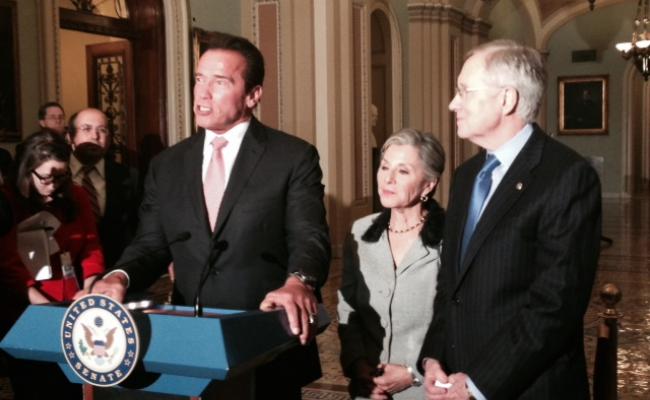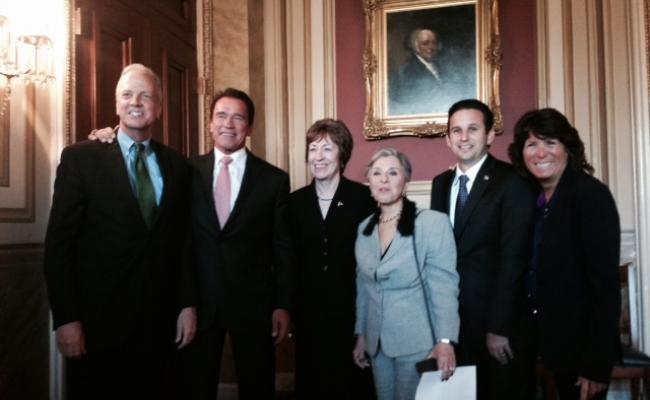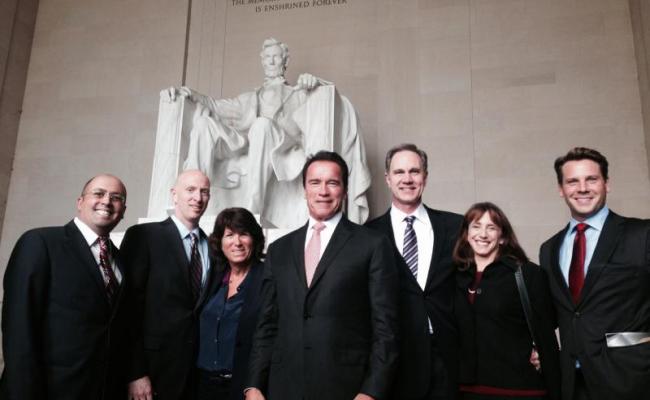Governor Arnold Schwarzenegger, Global Director Bonnie Reiss, and USC Price School of Public Policy Dean Jack Knott turned policy into action.
On October 30th the USC Schwarzenegger Institute held a series of meetings in Washington D.C. with our nation's leaders to advocate continued support of comprehensive after-school programs. Several Members of Congress sought to divert the monies to their own favored programs, thereby threatening the funding for these important programs.
Joining forces with the leader of After-School All Stars, Ben Paul, and the After-School Alliance, Jodi Grant, the Schwarzenegger Institute organized a day of meetings in our Nation’s Capitol with the single goal of influencing policy and protecting over $1 billion dollars currently allocated to after-school programs operating in every single state and serving over 1.6 million students. Because Congress was in midst of considering the budget and reauthorization of the Elementary and Secondary Education Act (ESEA), our Institute strategically timed the meetings to coincide with these congressional discussions.
The meetings and strategy were consistent with the mission and principles of our Institute in the following ways: (1) understands that our nation is best served when leaders of both parties are willing to work together, putting what is best for the people over what might be best for their political party , and (2) understanding the importance of research and evidence in formulating public policy.
Governor Schwarzenegger provided a passionate and first hand real world perspective on the importance of comprehensive after-school programs, having been involved with these programs for over twenty years. As founder of After-School All-Stars, a national after-school program provider, and Honorary Chair of the After-School Alliance, Schwarzenegger brought not just star power, but credibility to make the case in Congress. Schwarzenegger also knew the bi-partisan popularity of these programs, having successfully passed a California ballot initiative which provided over half a billion dollars to California schools seeking to run a comprehensive year-long after-school program.
Dean Jack Knott provided academic gravitas by discussing the extensive research compiled by the Mott Foundation and the After-School Alliance. Schwarzenegger Institute Global Director Bonnie Reiss organized the day of meetings to be consistent with the goal of post-partisanship, assuring that all the meetings were bi-partisan. The Institute team met with Education Secretary Arne Duncan at the U.S. Department of Education, and then with a bi-partisan group of U.S. Senators hosted by Majority Leader Harry Reid, and a bi-partisan group of House members, hosted by Majority Whip Congressman Kevin McCarthy.
The success of the "policy in action" day was evidenced not just by the participation of leaders from both parties, but also by their stated commitment to continue support for these programs. All the policymakers agreed the programs were needed and impactful, and key for preparing children to be college and career ready.
Following the meetings Majority Leader Reid hosted a press conference where Senator Barbara Boxer (the original author of this program, which started over 14 years ago) was able to thank her former Governor for his remarkable leadership both in California and nationally. Both Boxer and Schwarzenegger expressed confidence to the press and to the public that policymakers would not divert the funds supporting these great programs.
When asked by the press about which issues he felt most passionate, Schwarzenegger replied, "I am passionate about children, about education, and about after-school programs. I am passionate about our environment. I am passionate about health care, about fitness and obesity. I am passionate about getting Republicans and Democrats working together for the people. And I am passionate about the USC Schwarzenegger Institute"
As the successful day of meetings came to a close Governor Schwarzenegger said to Dean Knott and Global Director Reiss, "This is exactly what I envisioned my policy Institute would do when we partnered with USC."



